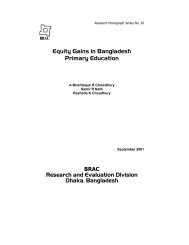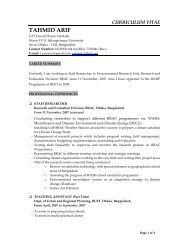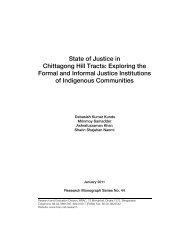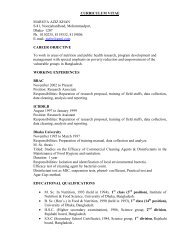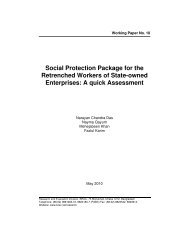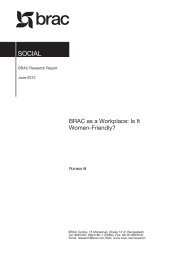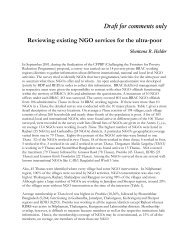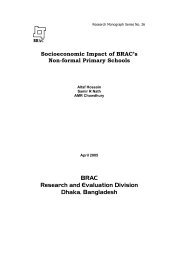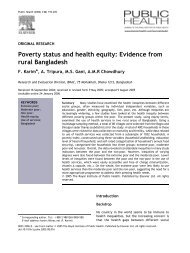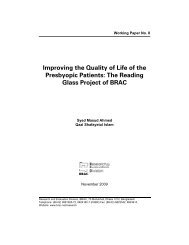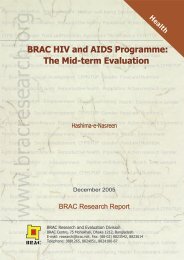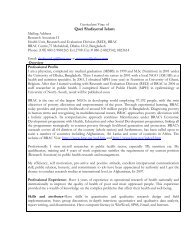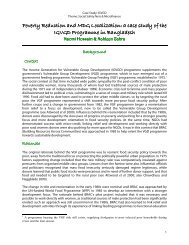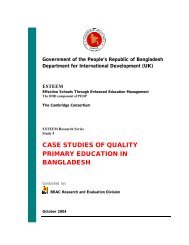Combining health and social protection measures to reach the ultra ...
Combining health and social protection measures to reach the ultra ...
Combining health and social protection measures to reach the ultra ...
You also want an ePaper? Increase the reach of your titles
YUMPU automatically turns print PDFs into web optimized ePapers that Google loves.
Decision-making<br />
desire <strong>to</strong> publish. The core of <strong>the</strong> issue in using evidence<br />
differently lies in <strong>the</strong> differences in decision-making<br />
imperatives. Not only might scientific evidence conflict with<br />
values <strong>and</strong> beliefs of policy-makers, but <strong>the</strong> policy-maker<br />
uses evidence in <strong>the</strong> battle <strong>to</strong> control problem definition <strong>and</strong><br />
policy solutions. Policy-makers thus look for evidence<br />
<strong>to</strong> support <strong>the</strong>ir claims, <strong>and</strong> thus systematic bias occurs in<br />
<strong>the</strong> way that policy-makers look for <strong>and</strong> use data. Ano<strong>the</strong>r<br />
facet of this issue is that policy-makers are often concerned<br />
that highlighting knowledge gaps will reduce support<br />
for <strong>the</strong>ir programmes. They thus end up making uninformed<br />
decisions.<br />
Fur<strong>the</strong>r complicating <strong>the</strong> issues are <strong>the</strong> weaknesses in logic<br />
in both scientific <strong>and</strong> policy-making approaches <strong>to</strong> setting<br />
priorities <strong>and</strong> achieving outcomes. Science <strong>and</strong> policy-making<br />
are chaotic in different ways. Most scientific research is<br />
derivative, <strong>and</strong> unhelpful from a policy perspective. The 23rd<br />
paper on smoking <strong>and</strong> a certain disease may still be<br />
published, but it is not really advancing science unless <strong>the</strong><br />
study is somehow markedly better than previous studies; <strong>to</strong>o<br />
often, it is not. In o<strong>the</strong>r words, <strong>the</strong>re is a lot of indifferent or<br />
“junk” science out <strong>the</strong>re, <strong>and</strong> policy-makers are clever<br />
enough <strong>to</strong> recognize this. Policy-making is built on a his<strong>to</strong>ry<br />
of related policies, but is also reactive <strong>to</strong> numerous <strong>and</strong><br />
competing stakeholder dem<strong>and</strong>s. At <strong>the</strong> end of <strong>the</strong> day,<br />
policies are <strong>the</strong> result of compromises <strong>and</strong> are constantly<br />
framed <strong>and</strong> re-framed in response <strong>to</strong> changing contexts.<br />
Also, researchers are always wanting <strong>to</strong> hedge <strong>the</strong>ir<br />
findings – <strong>the</strong>y recognize <strong>the</strong> limitations of <strong>the</strong>ir data <strong>and</strong> are<br />
striving <strong>to</strong> provide proof “beyond reasonable doubt” –<br />
however, policy-makers need a simple one-line answer <strong>to</strong><br />
what are often, at least <strong>to</strong> <strong>the</strong> researchers, complex issues. In<br />
presenting <strong>the</strong>ir results, researchers traditionally rely on so<br />
many caveats that policy-makers do not know what <strong>to</strong><br />
believe. Policy-makers frequently have <strong>to</strong> exercise moral<br />
Facilita<strong>to</strong>rs<br />
Number of studies<br />
Personal contact between researchers<br />
<strong>and</strong> policy-makers 13<br />
Timeliness <strong>and</strong> relevance of <strong>the</strong> research 13<br />
Research that includes a summary with<br />
clear recommendations 11<br />
Research that confirms current policy or<br />
endorses self-interest 6<br />
Good quality research 6<br />
Community pressure or client dem<strong>and</strong> for research 4<br />
Inclusion of effectiveness data 3<br />
TOTAL studies 24<br />
Barriers<br />
Number of studies<br />
Absence of personal contact between<br />
researchers <strong>and</strong> policy-makers 11<br />
Lack of timeliness <strong>and</strong> relevance of research 9<br />
Mutual mistrust between researchers <strong>and</strong> policy-makers 8<br />
Power <strong>and</strong> budget struggles 7<br />
Poor quality of research 6<br />
Political instability or high turnover of policy-making staff 5<br />
TOTAL studies 24<br />
Table 2: Facilita<strong>to</strong>rs <strong>and</strong> barriers <strong>to</strong> use of research by policymakers,<br />
identified in a systematic review of 24 interview studies<br />
(tabulation of data provided by Innvaer et al., 2002 7 )<br />
judgements in <strong>the</strong> face of uncertainty, so decisions are taken<br />
“on <strong>the</strong> balance of probabilities”. They usually have plenty on<br />
<strong>the</strong>ir plates, <strong>and</strong> gravitate <strong>to</strong>wards evidence that speaks <strong>to</strong><br />
<strong>the</strong>ir own experiences, or that of <strong>the</strong>ir constituents. They seek<br />
a “one size fits all” or “cookie cutter” approach. Policy-makers<br />
want a “bot<strong>to</strong>m line”, but researchers are uncomfortable<br />
giving one.<br />
Researchers <strong>and</strong> policy-makers also tend <strong>to</strong> have different<br />
accountability mechanisms. Researchers are essentially<br />
accountable <strong>to</strong> edi<strong>to</strong>rs of peer-reviewed journals, fellow<br />
researchers <strong>and</strong> those who fund <strong>the</strong>ir research. They may be<br />
interested in policy but, at <strong>the</strong> end of <strong>the</strong> day, are not required<br />
<strong>to</strong> focus on issues that have policy relevance or application.<br />
On <strong>the</strong> o<strong>the</strong>r h<strong>and</strong>, policy-makers are usually accountable <strong>to</strong><br />
political parties, government <strong>and</strong> taxpayers, if not <strong>the</strong> voters,<br />
<strong>and</strong> must focus on things that are consistent with political<br />
agendas. Complicating this however is <strong>the</strong> increasing<br />
pressure on researchers <strong>to</strong> comply with views of governments<br />
that are increasingly responsible for setting priorities in <strong>the</strong><br />
way research funds are allocated. So smart researchers will<br />
have <strong>the</strong>ir research proposals reviewed by policy-makers<br />
before submitting <strong>the</strong>ir grant proposals.<br />
There is unfortunately no correlation between <strong>the</strong> quality of<br />
science <strong>and</strong> <strong>the</strong> policy derived from it. Good science does not<br />
always guarantee good policy; bad or even no science does<br />
not necessarily lead <strong>to</strong> bad policy. It is true that good policy<br />
does not always depend on waiting for good evidence. For<br />
example, condom promotion makes good common sense<br />
when setting policies <strong>to</strong> tackle sexually transmitted diseases.<br />
On <strong>the</strong> o<strong>the</strong>r h<strong>and</strong>, having a policy, no matter how carefully<br />
thought out, is no guarantee that it works. Having a policy for<br />
clean water, for example, does not necessarily make <strong>the</strong> water<br />
clean. It must be realized that science is needed both <strong>to</strong> help<br />
develop <strong>the</strong> policy <strong>and</strong> <strong>to</strong> evaluate <strong>the</strong> policy.<br />
Ano<strong>the</strong>r issue is related <strong>to</strong> <strong>the</strong> public image. Researchers<br />
are often respected as “wise <strong>and</strong> objective people”, free from<br />
political <strong>and</strong> economic interests <strong>and</strong> pressures. Policy-makers<br />
are often regarded as “powerful people”, but are not<br />
necessarily respected. It is not that ei<strong>the</strong>r researchers or<br />
policy-makers are “wrong” or “bad”. One responds <strong>to</strong><br />
scientific rationality, while <strong>the</strong> o<strong>the</strong>r responds <strong>to</strong> political<br />
pressures. Fur<strong>the</strong>rmore, <strong>the</strong> societies within which <strong>the</strong>y work<br />
also have norms <strong>and</strong> expectations, which might be<br />
considered “cultural rationality”. The coming <strong>to</strong>ge<strong>the</strong>r of <strong>the</strong>se<br />
competing rationalities is necessary <strong>to</strong> resolve <strong>the</strong> seeming<br />
incompatibilities <strong>and</strong> ultimately ending up with <strong>the</strong> adoption<br />
of evidence-based <strong>health</strong> policies.<br />
Some suggestions on bridging <strong>the</strong> gap<br />
How can we bridge this chasm <strong>and</strong> gap between researchers<br />
<strong>and</strong> policy-makers? Arguably, a key first step might be an<br />
attempt <strong>to</strong> underst<strong>and</strong> what may be <strong>the</strong> predic<strong>to</strong>rs of success<br />
(<strong>and</strong> failure) in <strong>the</strong> way researchers <strong>and</strong> policy-makers<br />
communicate <strong>and</strong> value each o<strong>the</strong>rs’ efforts. Innvaer et al.<br />
reviewed 24 interview studies with <strong>health</strong> policy-makers (a<br />
<strong>to</strong>tal of 2041 interviews) concerning <strong>the</strong>ir perceptions of <strong>the</strong><br />
use of research evidence in <strong>health</strong> policy decisions 7 . The most<br />
commonly reported facilita<strong>to</strong>rs were personal contact (13/24<br />
156 ✜ Global Forum Update on Research for Health Volume 4



